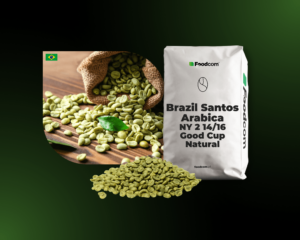- Global coffee prices continue to rise. In Brazil, local prices – already high – have risen a further 50% in three months.
- Cheaper products that are artificial coffee equivalents are appearing on the market.
- ABIC, the coffee roasters’ association, is worried about consumers and is asking state bodies to comment.
Fake coffee deceives consumers
The Brazilian coffee industry is concerned about the dangers of counterfeit coffee entering the market. Consumers may become interested in such products due to the high prices of real coffee and the perceived scarcity. The Brazilian coffee roasters’ association, ABIC, recently identified ‘coffee powder‘ on the food market, most of which is not made from coffee beans. Such products are offered at around a third of the price of real coffee. ABIC has asked Brazilian health agencies and the Ministry of Agriculture about the legality of such practices, as there are serious concerns about misleading consumers.
What are fake coffees made of?
Powdered products purporting to pretend to be coffee often contain beans that have not been ground, but waste from their processing, such as leaves, peels, as well as vegetable pulp and artificial coffee flavourings. Such products do not claim to be coffee, but have packaging along the lines of local coffee brands, printed with a cup of coffee. An example is the Oficial do Brasil product described as a ‘traditional coffee-flavoured drink’. It is only in smaller letters that ‘artificial coffee flavour’ is mentioned. Producers of this type of product claim that they are merely supplementing market demand, responding to the needs of consumers who cannot afford real coffee. Indeed, coffee prices in Brazil have risen by 50% in the last three months.
We encourage you to read the following interesting article: Brazilian coffee – a unique taste and a rich tradition

![Counterfeit coffee a threat to Brazilian market [World News] Counterfeit coffee a threat to Brazilian market [World News]](https://foodcom.pl/wp-content/uploads/2023/09/Foodcom_World_News_CAT_3-1520x760.jpg)


![High cocoa prices drive up confectionery prices and losses for producers [World News] High cocoa prices drive up confectionery prices and losses for producers [World News]](https://foodcom.pl/wp-content/uploads/2023/09/Foodcom_World_News_Global_Stock-600x300.jpg)
![European Union plans to ban PFAS additives [World News] European Union plans to ban PFAS additives [World News]](https://foodcom.pl/wp-content/uploads/2023/09/Foodcom_World_News_Industrials-600x300.jpg)
![Sugar prices lowest in 3 years – what does the market have in store for the near future? [World News] Sugar prices lowest in 3 years – what does the market have in store for the near future? [World News]](https://foodcom.pl/wp-content/uploads/2023/09/Foodcom_World_News_Additives-600x300.jpg)

